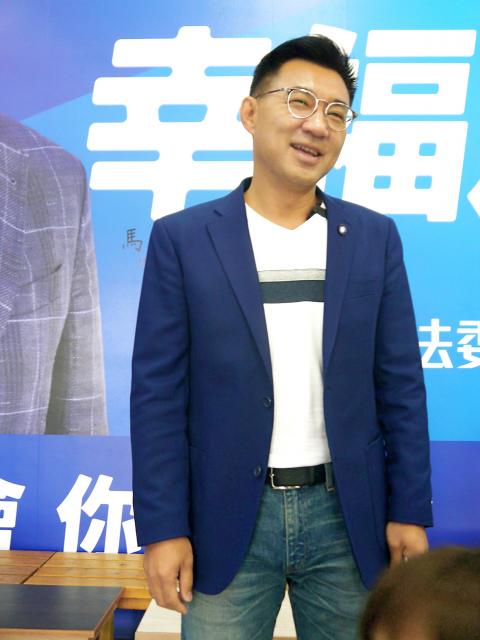The Chinese Nationalist Party’s (KMT) Central Standing Committee yesterday passed a decision to establish a committee tasked with drafting reform proposals for the party.
The new committee would consist of Central Standing Committee members, KMT mayors, county commissioners, legislators and local councilors, as well as party members who can represent younger generations, party chairperson by-election candidates, experts and academics, the party said.
The reform committee would have four sections devoted to reforming in the party’s personnel structure, cross-strait policy, youth participation and finances, it said.

Photo: Chang Hsuan–che, Taipei Times
Each section is required to submit a reform proposal by the end of March, it added.
A preparatory committee headed by KMT Acting Chairman Lin Rong-te (林榮德) would handle the work to establish the reform committee, the party said, adding that Lin would also serve as the convener of the new committee until a new chairperson is elected.
The Central Standing Committee also passed a decision to ban all members who have worked in the Chinese People’s Political Consultative Conference or the Chinese National People’s Congress from running for a seat on the Central Standing Committee or Central Committee.
Such people would be punished according to party regulations or disqualified from the chairperson by-election, the party said.
After former KMT chairman Wu Den-yih (吳敦義) and many upper management members stepped down on Wednesday last week to shoulder responsibility for the party’s defeats in the Jan. 11 presidential and legislative elections, the Central Standing Committee yesterday approved a new list of personnel.
KMT Legislator Alicia Wang (王育敏) and KMT Election Deployment Department head Huang Pi-yun (黃碧雲) have been appointed the party’s Culture and Communications Committee acting director-general and Organizational Development Committee acting director respectively, the party said.
KMT Deputy Secretary-General Chou Jih-shine (周繼祥), Administration and Management Committee director Chiu Da-chan (邱大展) and Evaluation and Discipline Committee director Wei Ping-cheng (魏平政) would remain at their posts, it said.
Separately yesterday, KMT Legislator Johnny Chiang (江啟臣) said that he is considering joining the chairperson by-election on March 7.
“I will seriously think about what might be the best position that would allow me to contribute the most to the party,” he told reporters in Taichung.
He would make a decision by Friday next week, the last day for prospective candidates to pick up a registration form, he said.
Former New Taipei City mayor Eric Chu (朱立倫) also hinted at a possible chairmanship bid.
He would use the Lunar New Year holiday to ponder on reform efforts and the by-election, and let the public know what he thinks before the end of the holiday, he said in a written statement.
“The party’s reform is more important than its election,” he said, adding that party members must share the responsibility of moving the party forward in their respective ways.
Three people have announced a bid to run for KMT chairperson: former KMT vice chairman Hau Lung-bin (郝龍斌), National Taiwan University political science professor Chang Ya-chung (張亞中) and Blue Sky Action Alliance convener Wu Chih-chang (武之璋).

US climber Alex Honnold is to attempt to scale Taipei 101 without a rope and harness in a live Netflix special on Jan. 24, the streaming platform announced on Wednesday. Accounting for the time difference, the two-hour broadcast of Honnold’s climb, called Skyscraper Live, is to air on Jan. 23 in the US, Netflix said in a statement. Honnold, 40, was the first person ever to free solo climb the 900m El Capitan rock formation in Yosemite National Park — a feat that was recorded and later made into the 2018 documentary film Free Solo. Netflix previewed Skyscraper Live in October, after videos

NUMBERS IMBALANCE: More than 4 million Taiwanese have visited China this year, while only about half a million Chinese have visited here Beijing has yet to respond to Taiwan’s requests for negotiation over matters related to the recovery of cross-strait tourism, the Tourism Administration said yesterday. Taiwan’s tourism authority issued the statement after Chinese-language daily the China Times reported yesterday that the government’s policy of banning group tours to China does not stop Taiwanese from visiting the country. As of October, more than 4.2 million had traveled to China this year, exceeding last year. Beijing estimated the number of Taiwanese tourists in China could reach 4.5 million this year. By contrast, only 500,000 Chinese tourists are expected in Taiwan, the report said. The report

Temperatures are forecast to drop steadily as a continental cold air mass moves across Taiwan, with some areas also likely to see heavy rainfall, the Central Weather Administration (CWA) said. From today through early tomorrow, a cold air mass would keep temperatures low across central and northern Taiwan, and the eastern half of Taiwan proper, with isolated brief showers forecast along Keelung’s north coast, Taipei and New Taipei City’s mountainous areas and eastern Taiwan, it said. Lows of 11°C to 15°C are forecast in central and northern Taiwan, Yilan County, and the outlying Kinmen and Lienchiang (Matsu) counties, and 14°C to 17°C

STEERING FAILURE: The first boat of its class is experiencing teething issues as it readies for acceptance by the navy, according to a recent story about rudder failure The Hai Kun (海鯤), the nation’s first locally built submarine, allegedly suffered a total failure of stern hydraulic systems during the second round of sea acceptance trials on June 26, and sailors were forced to manually operate the X-rudder to turn the submarine and return to port, news Web site Mirror Daily reported yesterday. The report said that tugboats following the Hai Kun assisted the submarine in avoiding collisions with other ships due to the X-rudder malfunctioning. At the time of the report, the submarine had completed its trials and was scheduled to begin diving and surfacing tests in shallow areas. The X-rudder,